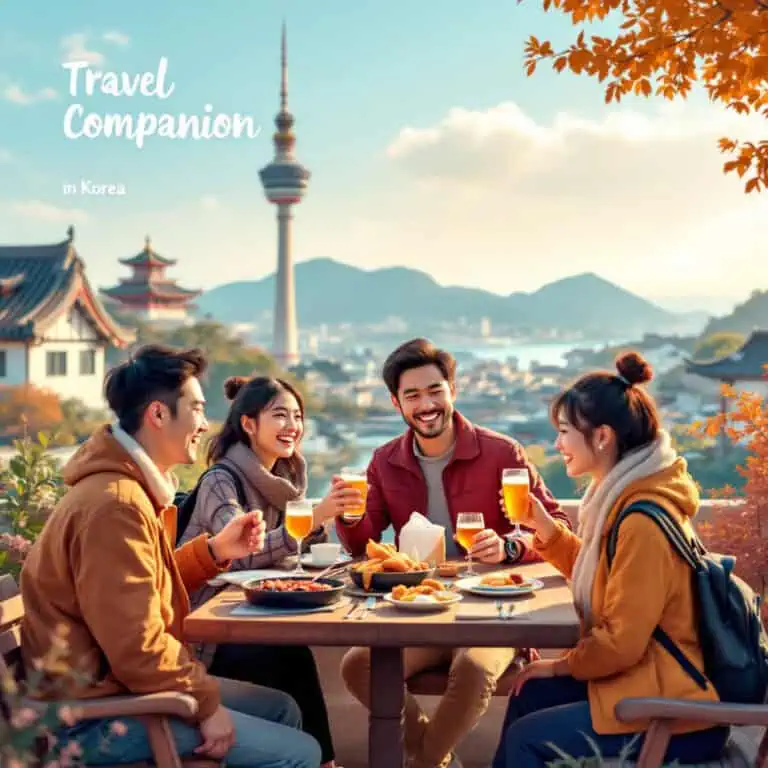Essential Korean Phrases for Travelers 2025: Speak Like a Local
Introduction
If you’re planning a trip to Korea, learning just a few words can completely change your experience. These Essential Korean Phrases for Travelers are not about fluency—they’re about making locals smile, breaking the ice, and getting help when you need it most. Even imperfect pronunciation shows effort and respect, and Koreans appreciate when visitors try.
This guide highlights the Essential Korean Phrases for Travelers in 2025, focusing on real-life situations like dining, directions, making friends, and emergencies. Use them with confidence and your trip will be smoother and far more memorable.
1. Core Survival Phrases
These polite basics will help you in almost every situation:
- Hello → 안녕하세요 (annyeong-haseyo)
- Thank you → 감사합니다 (gamsahamnida)
- Sorry/Excuse me → 죄송합니다 (joesonghamnida)
- How much is this? → 이거 얼마예요? (igeo eolmayeyo?)
- Where is ___? → ___ 어디예요? (eodi-yeyo?)
- Please help me → 도와주세요 (dowajuseyo)
👉 Perfect for shopping, asking directions, or daily interactions.
2. Food & Dining Essentials
Korean food is a highlight of any trip. These phrases will make ordering easy:
- This one, please → 이거 주세요 (igeo juseyo)
- Not spicy, please → 맵지 않게 해주세요 (maepji anke haejuseyo)
- It’s delicious! → 맛있어요 (masisseoyo)
- Check, please → 계산서 주세요 (gyesanseo juseyo)
👉 Use them at restaurants, markets, and street food stalls.
3. Social & Connection Phrases
Travel is more fun with new friends. These phrases help you connect:
- Where are you from? → 어디서 오셨어요? (eodiseo osyeosseoyo?)
- Let’s go together → 같이 가요 (gachi gayo)
- Can we sit here? → 여기 앉아도 돼요? (yeogi anjado dwaeyo?)
- Nice to meet you → 반가워요 (bangawoyo)
👉 Great for hostels, cafés, tours, or festivals.
4. Transport & Navigation
Korea’s public transportation is efficient, but these phrases make it easier:
- Where is the bus/subway? → 버스/지하철 어디예요? (beoseu/jihacheol eodi-yeyo?)
- How do I charge my T-money card? → 티머니 충전 어디서 해요?
- One KTX ticket, please → KTX 표 하나 주세요
👉 Useful at stations, airports, and ticket counters.
5. Emergency & Safety Phrases
It’s always best to be prepared:
- Police station → 경찰서 (gyeongchalseo)
- Pharmacy → 약국 (yakguk)
- Hospital → 병원 (byeongwon)
- I’m lost → 길 잃었어요 (gil ilheosseoyo)
- Help me → 도와주세요 (dowajuseyo)
👉 In stressful situations, even one Korean word can make all the difference.
6. Tools to Help (with DKN Highlight)
Translation apps like Papago or Google Translate are excellent for communication. While Discover Korea Now (DKN) doesn’t provide built-in translation, it connects you with real people—travelers and locals—who can help when you need it most.
👉 Remember: translation apps assist with words, but DKN helps with people. Together, they make your trip more meaningful.
7. Etiquette: How to Use Korean Naturally
- Always use polite endings (예요, 요) → shows respect.
- Smile when saying “감사합니다” (thank you). Koreans love it.
- Don’t worry about perfect pronunciation—the effort itself is valued.
👉 These small details make your Korean phrases more effective.
FAQ (Schema Ready)
Q: Do I need to learn Korean to travel in Korea?
A: No, but using a few Essential Korean Phrases for Travelers will make daily life easier and locals friendlier.
Q: Which apps should I use for translation?
A: Papago and Google Translate are the most reliable in Korea.
Q: Can I use English in Korea?
A: In big cities, yes. But in smaller towns, basic Korean helps a lot.
Q: How does DKN help with language barriers?
A: DKN connects you with other travelers and locals, so you can ask for help or practice together—even without automatic translation.
Conclusion
Learning these Essential Korean Phrases for Travelers can transform your trip. From ordering food to finding your way, they help you unlock authentic experiences and genuine connections. Even a few simple words can make locals smile, build friendships, and keep you safe.
👉 Use apps for translation, and use Discover Korea Now (DKN) to connect with real people who will share the journey. Because travel isn’t just about places—it’s about people.




